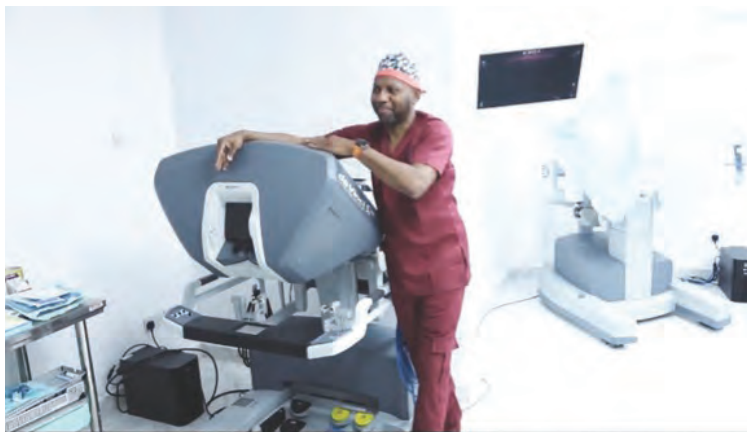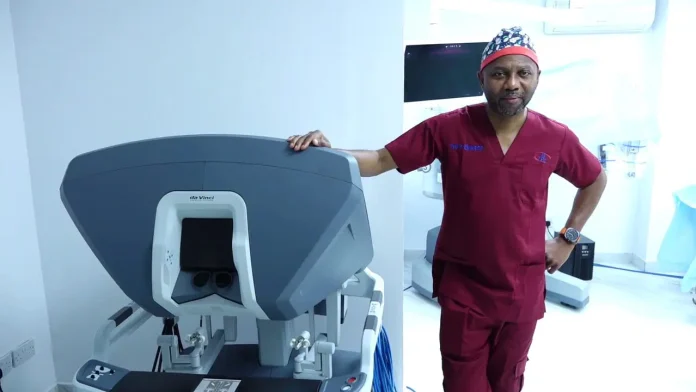By Anthony Emeka Nwosu
In a bold leap toward transforming the face of healthcare in Nigeria and West Africa, Professor Kingsley Ekwueme, a globally respected consultant urological and robotic surgeon, has achieved a historic medical milestone — successfully performing West Africa’s first robotic prostate cancer surgery in Lagos using the advanced Da Vinci robotic system.
The landmark procedure took place on March 25, 2025, at the Prostate Clinic (TPC) Nigeria Centre for Robotic and Laparoscopic Surgery, making Nigeria the first country in the sub-region to execute such a high-level procedure locally — a development hailed as a defining moment in Nigerian medical history.
Professor Ekwueme, a UK-trained surgical expert originally from Amanogu, Ihitenansa, in Orsu LGA of Imo State, established TPC Nigeria with a long-term vision: to bring world-class cancer treatment home to Nigerians, reduce medical dependency on foreign systems, and ignite a new era of healthcare excellence across West Africa.
A Groundbreaking Medical Feat With National Healthcare Implications
This successful surgery marks more than a personal achievement or a first-in-Africa headline — it signals a shift in the healthcare narrative of Nigeria. For decades, advanced procedures such as robotic prostatectomies were available only abroad, limiting access to those who could afford international medical travel.
Now, with this robotic technology installed and fully functional at TPC Nigeria, Nigerians can receive cutting-edge, minimally invasive cancer treatment without leaving the country — a development that could save millions in foreign exchange lost annually to medical tourism.
Addressing the Burden of Medical Tourism
According to healthcare expenditure data, Nigeria loses an estimated $1.2 billion annually to outbound medical tourism, with cancer treatment ranking among the top three reasons citizens seek care abroad.
With Professor Ekwueme’s milestone, a compelling case emerges for the strengthening of local healthcare sovereignty — ensuring that citizens can access advanced medical care within Nigeria’s borders.
“This is about reclaiming confidence in Nigerian healthcare,” Ekwueme emphasized. “Nigerians no longer need to travel to the UK, Germany, or India for procedures we now have the skill and technology to perform at home — and with the same level of excellence.”
“This is about reclaiming confidence in Nigerian healthcare,” Ekwueme emphasized. “Nigerians no longer need to travel to the UK, Germany, or India for procedures we now have the skill and technology to perform at home — and with the same level of excellence.”
Strengthening Local Capacity Through Training and Knowledge Transfer
One of the most powerful outcomes of this development lies in its potential to build indigenous capacity and skills. Recognizing that sustainability is key, Professor Ekwueme is initiating training programs at TPC Nigeria to empower Nigerian doctors with advanced robotic and laparoscopic surgical techniques.
“The vision is not just to create a centre of excellence, but a centre of knowledge,” he said. “By training local surgeons and medical teams, we are investing in a self-sustaining healthcare ecosystem that can outlive one individual and scale across the nation.”
This approach will help close the skill gap, reduce the need for foreign surgical fellowships, and equip local institutions with the talent pool needed to scale high-precision procedures across teaching hospitals and private clinics alike.
Affordable Access to Advanced Healthcare
While robotic surgery is associated with high-tech equipment and elite medicine, Professor Ekwueme is also pioneering cost-bridging models to ensure affordability does not become a barrier.
“At TPC Nigeria, our goal is to make access equitable. We’re working with health maintenance organizations (HMOs), public-private partnerships, and donor agencies to subsidize treatment for middle and lower-income patients,” he said.
In a country where access to quality healthcare is uneven, this model represents a path toward inclusive healthcare innovation, showing that cutting-edge medicine can be accessible, not just aspirational.
Tackling Prostate Cancer – A Silent Epidemic
Prostate cancer remains one of the most common cancers affecting Nigerian men, especially those over 50. Many patients are diagnosed late due to limited screening, cultural stigma, and lack of specialized care.
With the emergence of TPC Nigeria as West Africa’s first specialist prostate clinic, there is now a clear pathway to early detection, focused intervention, and comprehensive management of prostate cancer within the country.
Moreover, the introduction of robotic precision in prostate surgeries reduces complications such as erectile dysfunction and urinary incontinence — common challenges with traditional open surgeries. This advancement improves not just survival but also quality of life for patients post-treatment.
A Call for National Support and Policy Reform
Healthcare analysts and policy experts have called on government agencies, especially the Federal Ministry of Health and Nigerian Medical Association (NMA), to seize this moment as an opportunity to scale localized innovation and support private-sector-driven centers of excellence.
“Professor Ekwueme’s achievement is not just medical — it’s a strategic breakthrough in national development,” said Dr. Folake Akinwunmi, a Lagos-based healthcare economist. “Imagine the impact if even five other centres like TPC Nigeria exist across Nigeria’s six geopolitical zones. The savings, the access, the lives preserved — it’s immense.”
Final Word: Hope Renewed for Nigerian Healthcare
In a landscape often shadowed by brain drain, crumbling public hospitals, and costly overseas treatment, Professor Kingsley Ekwueme’s historic achievement is a beacon of possibility — proving that Nigerian professionals, when supported with vision and resources, can match global medical standards and redefine what is possible on African soil.
As robotic arms moved deftly inside a Lagos operating theatre, history was not just made — it was rewritten for the future of healthcare in Nigeria.




